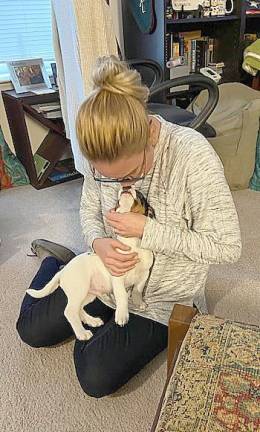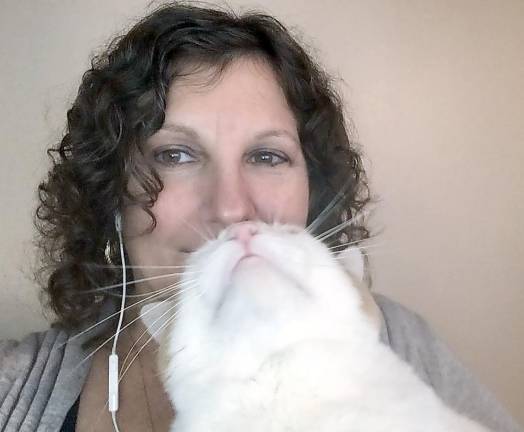‘There is always ... something else that ... needs your help’
The truth about cats and dogs. Furloughed from their jobs and locked down in their homes, many people turned to the companionship of dogs and kittens they adopted or fostered during the pandemic.



At the height of the pandemic, two Harvard teachers drove to the Goshen Humane Society to pick up a Beagle the shelter had been tending for seven months.
The woman stepped out of the car in a full hospital gown, while her companion stayed in the car.
They had seen the Beagle on Facebook and “were convinced that it was the dog for them,” said Susan Bossley, president of the society. They even donated $4,000 to pay for their new pup’s medical care.
‘The perfect time’
Furloughed from their jobs and locked down in their homes, many people turned to the companionship of dogs and kittens they adopted or fostered during the pandemic. They were prepared to go to great lengths to achieve the peace of mind they sought.
Local shelters experienced a surge in demand at the same time visitors were banned and applications were being taken only online.
As the pandemic gripped the region, “we had way more applications than we could process in a timely manner” said Pets Alive executive director Becky Tegze.
There has been concern that as workers returned to their jobs their new pets would be returned to shelters. But animal rescue organizations locally and nationwide haven’t seen that. The bonds between animal and human have proven strong, although some owners report that their pets have become anxious when their humans aren’t around as much. (Ironically, at the beginning of the pandemic some pets, particularly cats, were put out to see their space invaded.)
The pandemic was “the perfect time” to welcome a new pet, said Warwick Valley Humane Society president Suzyn Barron. Having a pet “gives you a reason to get up in the morning. You don’t really focus on yourself.”
Adoption was something “people had control over,” said Monroe veterinarian Howard Rothenberg, Goosepond Animal Hospital chief of staff. “The pandemic made people feel so helpless.”
Rothenberg and his wife Sarah Couper fostered a very sick baby goat from a farm in Middletown until it was well enough to find a home at Goats of Anarchy, a sanctuary for disabled farm animals in Hampton, N.J.
‘A welcome, loving distraction’
“Often people want to adopt but don’t have the time to commit to a new pet,” said Mary Esparra, a pet columnist for the Times Herald-Record for 20 years, who now has her own website, https://marys-sheltertails.org. However, the long quarantine gave adopters “the time to train the pet and get it adjusted to its new family. A new pet was also a welcome, loving distraction from all that was happening in the world.”
Esparra raised $31,526 in 2020 for her annual “$3 Shelter Challenge,” a program inspired by senior citizens who sent $3 six years ago to Warwick Valley to help a sick pigeon. She speculated that animal lovers may have been motivated to share some of the federal stimulus money they received. This year, her first with the new website, she received $8,973 for local shelters.
‘A foster fail’
Kathy McLoughlin of Monroe lost a pet in October 2019. In April 2020, Warwick Valley asked her to foster P.J, 7-year-old lab pit bull mix who had been at the shelter for four years. With volunteers no longer permitted to enter, he “could not get the extra attention he needed. He has arthritic legs and needs frequent walks to help manage his pain.”
“It’s been wonderful having a dog in the house again,” McLoughlin told Esparra last year “because he loves us that’s for sure. We love him, and it’s nice to have something to take our minds off the bad news. We can focus on loving him.”
In May 2020 McLoughlin became a “foster fail,” officially adopting P.J.
Pets Alive’s Tegze said that “our adoption staff was Zooming and Face-timing with potential adopters with the animals so adopters were getting to see how the cats and dogs interacted with people.”
Pets Alive’s first adoptions
Karen Johnson of New Windsor welcomed two cats, 3-year-old Petie and 4-year-old Jenny, in what she said was Pets Alive’s first virtual adoption.
Johnson had been working remotely even before the pandemic, but had spent about 40 percent of her time on business trips. The pandemic ended her travel.
“It was extremely isolating, hard to get out of your own head,” she said. She credits her decision to adopt with the fact that her blood pressure has gone down.
She dotes on her new roommates. She has installed a kitty cam to check up on them when she is out. “They came right up and look at the screen.”
Cats versus dogs
There are plenty of cats in local shelters available for adoption, 61 at Warwick alone recently. But local shelters have not been able to fill every request for dogs, especially since prospective adopters often have something specific in mind.
The number of dogs adopted from Warwick actually declined last year. Barron said that some of the dogs the shelter housed had special needs or were large, while adopters usually prefer small or medium-sized breeds.
Maureen Hogan, shelter manager of the Middletown Humane Society, said that a lot of people wanted dogs last year, but fewer were coming from the South. The bright spot in that trend was that “we got to pick and choose” among potential pet parents, she said.
‘Not a COVID decision’
People seeking a pet often scour Facebook or online sites like Adopt-a-Pet.com or petfinder.com. The Humane Society of Blooming Grove has sent a dog to Maine and Warwick Valley recently received an application from Missouri.
Amelia Moller of Middletown was home from her court reporter job for 18 months, but adoption “wasn’t a COVID decision.”
She just wanted a dog.
She spent four months “poking around” local shelters and on the Internet for a suitable pet. She finally made a connection with a shelter in Tennessee. A pet transportation service delivered her pup to Mahwah in December – a 10-month-old mini dachshund, mini-Australian shepherd mix she and her husband named Fogarty or “Fogs.”
At one point the Tennessee shelter was receiving hundreds of applications a day for 20-30 dogs. Moller volunteered to help deal with the paperwork and has facilitated an adoption for at least one other Orange County couple. But she said demand has plummeted.
“People are going back to work,” she said. “They don’t want to deal with dogs.”
Jenn Nelson of Woodstock was intrigued by the masklike black face staring out at her on the Petfinders website. The cat was available for adoption at Blooming Grove, where it had been trapped by Highway Department staff in 2017.
The 17-year-old black-and-white cat Nelson adopted and named “CatMan” in June 2020 was “really messed up,” Nelson said, with thyroid and kidney issues. She had been looking for a kitten, but her job has been shut down and she realized she would have the time to deal with his severe medical problems.
In Woodstock, CatMan joined a menagerie of three rescue dogs and one other cat.
CatMan passed on July 13 as Nelson stroked his hair and sang to him.
“You asked me why on earth I would adopt the most messed up cat on the planet,” she said in an email. “When the planet was in a state I’ve never known in my 50 years it felt right to do good for something else, but he also gave me a focus when everything else was falling apart. I think in the end it was just a lesson that love is all that matters and that it can be what saves us all. When you are at your lowest there is always someone or something else that may be lower and needs your help. “